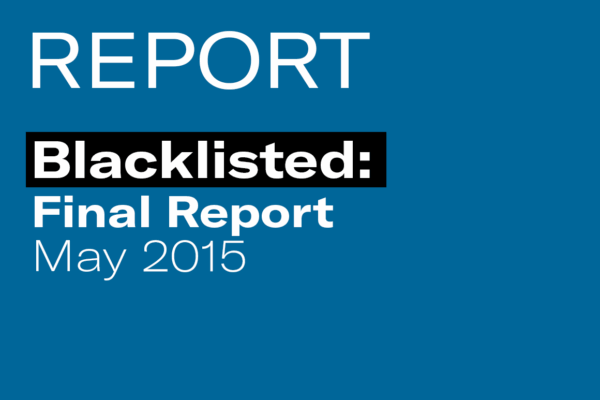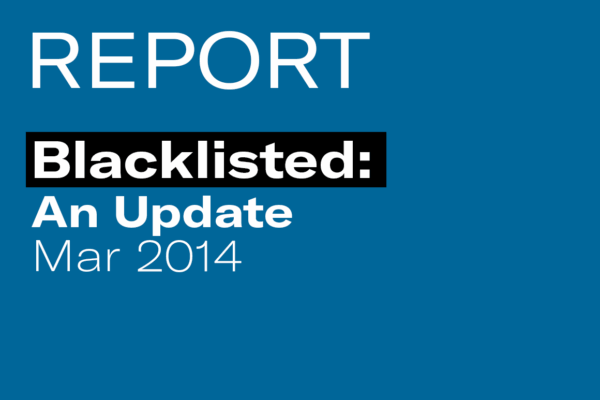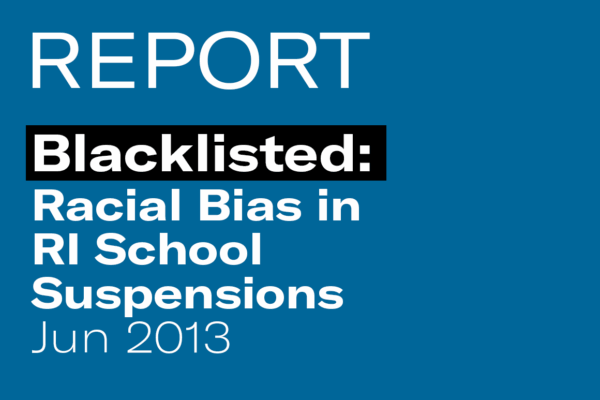The ACLU of Rhode Island issued a report today, analyzing eight years of data, showing that in all school districts across Rhode Island, black and Hispanic students are suspended at rates substantially higher than their representation in the student population, while white students are suspended much less often than their representation predicts. Worse, the disproportionate suspensions are often for minor behavioral infractions and begin in elementary school. The ACLU’s examination of school discipline data collected by the Rhode Island Department of Education between 2004 and 2012 also concluded that suspensions are routinely overused as punishment against students statewide.
Among the major findings of the report, “Blacklisted: Racial Bias in School Suspensions in Rhode Island,” are the following:
OVERUSE OF SUSPENSIONS
- Despite significant evidence that out-of-school suspensions are counter-productive and carry long-term unintended consequences, on average more than twelve thousand students lose more than 54,000 school days each year to suspensions. Often, these students are suspended for relatively low-risk behavioral infractions such as “Disorderly Conduct” or “Insubordination/Disrespect.”
- The overuse of suspensions extends to the lowest grades. Almost 1,400 elementary school students were suspended last year; 173 of them were in the first grade.
RACIAL DISPARITIES IN SUSPENSIONS
- Nearly all of Rhode Island’s public school districts consistently suspend black students at rates disproportionate to their representation in the student body, and the vast majority of school districts over-suspend Hispanic students. Fifteen districts disproportionately suspended black students in every single year studied, while eight did the same for Hispanic students. No school district or charter school disproportionately suspended white students on any regular basis.
- Disparities not only begin at an early age, but are particularly pronounced in elementary school. While black high school students are twice as likely as white high school students to be suspended, a black elementary school student is six times as likely as a white elementary school student to be suspended from school. Suspension is three times as likely for a Hispanic elementary school student than a white elementary school student.
ACLU Policy Associate Hillary Davis, author of the report, said today: “Out-of-school suspensions are used too often to punish infractions that in no way justify the long-term consequences that suspensions can carry. For minority students, reconsideration of the use of out-of-school suspensions is particularly critical.”
In order to ensure students receive equal treatment in regard to discipline, and equal access to the opportunities the classroom has to offer, the report recommended:
- Schools should minimize the use of out-of-school suspensions, applying them only when necessary to protect the safety of other students or when other attempts at correcting behavior have failed.
- School districts should examine annually their discipline rates for any racial or ethnic disparities, make this information available to parents and the public, and identify ways to eliminate any disparities in the future, including through increased teacher and administrator training and supports.
- Schools should make their policies and procedures regarding discipline of students easily accessible, and ensure that punishments are clearly and evenly established for various offenses.
- The Department of Education should investigate and promote the use of alternative evidence-based disciplinary methods, including positive behavior interventions.
The report concluded: “The ACLU of Rhode Island hopes that by bringing these significant disparities to light, school districts statewide will re-examine their own suspension practices and rates and make positive changes assuring equal and fair treatment for all students.”
The report follows a separate report that the ACLU issued yesterday, documenting large racial disparities in the state in the arrests of blacks and whites for marijuana possession.




